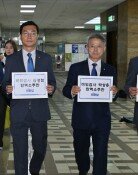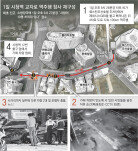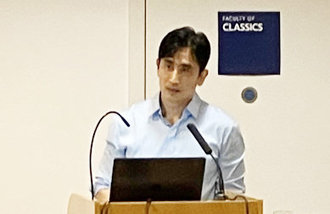Trump strengthens his lead in the presidential campaign
Trump strengthens his lead in the presidential campaign
Posted July. 01, 2024 07:53,
Updated July. 01, 2024 07:53
Last week's first televised debate between the U.S. presidential candidates threw Washington and the world into chaos. As the aging President Joe Biden struggled to hold his own in a logical debate, there were strong calls from within the Democratic Party for a replacement. Media outlets in major European countries, including the U.K. and France, have also argued that a replacement is inevitable. The election was neck and neck at the beginning of the year when Trump was in the lead, but now Trump has solidified his lead.
Trump's increased likelihood of re-election signals a major shift in the U.S.-ROK alliance over the next four years. As he did in his first term, he will likely view the alliance as an object of trade and negotiation. “Why would we defend a rich country like South Korea with American tax dollars?” Mr. Trump said in a Time magazine interview a month ago. The Trump administration is expected to call for further reductions in the size of the U.S. Forces in Korea, which currently stands at 28,500 soldiers, and a significant increase in the annual cost of the U.S. military presence in South Korea, which is about 1.2 trillion won. The Trump campaign has been touting a new principle that the U.S. would continue to provide a nuclear umbrella, which it calls 'extended deterrence,' but that South Korea would be responsible for its own conventional weapons defense.
Trump could re-engage in North Korean nuclear negotiations after taking office. The 2019 Hanoi talks collapsed after Kim Jong Un demanded a complete end to economic sanctions in exchange for the abandonment of some nuclear facilities, including Yongbyon. Nowadays, key members of the Trump campaign are discussing the possibility of a deal in which sanctions would be lifted if North Korea only freezes its nuclear program rather than dismantling it. After the debate, these security risks have only increased.
It is also hard to imagine the impact of Trump's pledge to “sign an executive order to end EV subsidies on my first day in office.” The comment was directed at Michigan workers who feel their jobs are threatened if electric vehicles, which require 40 percent fewer parts than internal combustion engines, dominate the market. This creates uncertainty for the investment strategies of Korean automotive and battery companies that have invested heavily in the U.S. under Biden's Inflation Reduction Act (IRA).
After four years of Trump, the international community is nervous about the prospect of his return. Many of the experienced advisors from his first administration have left him. We shudder to think of the disruption a second Trump presidency could cause: ripping apart alliances, compromising with North Korea, and shaking the foundations of our industries. In the end, we can only prepare for what's coming. We need to work with the Biden administration and convince officials from Trump’s team of South Korea's interests and realities. We must quietly prepare for Trump's second term with urgency.







